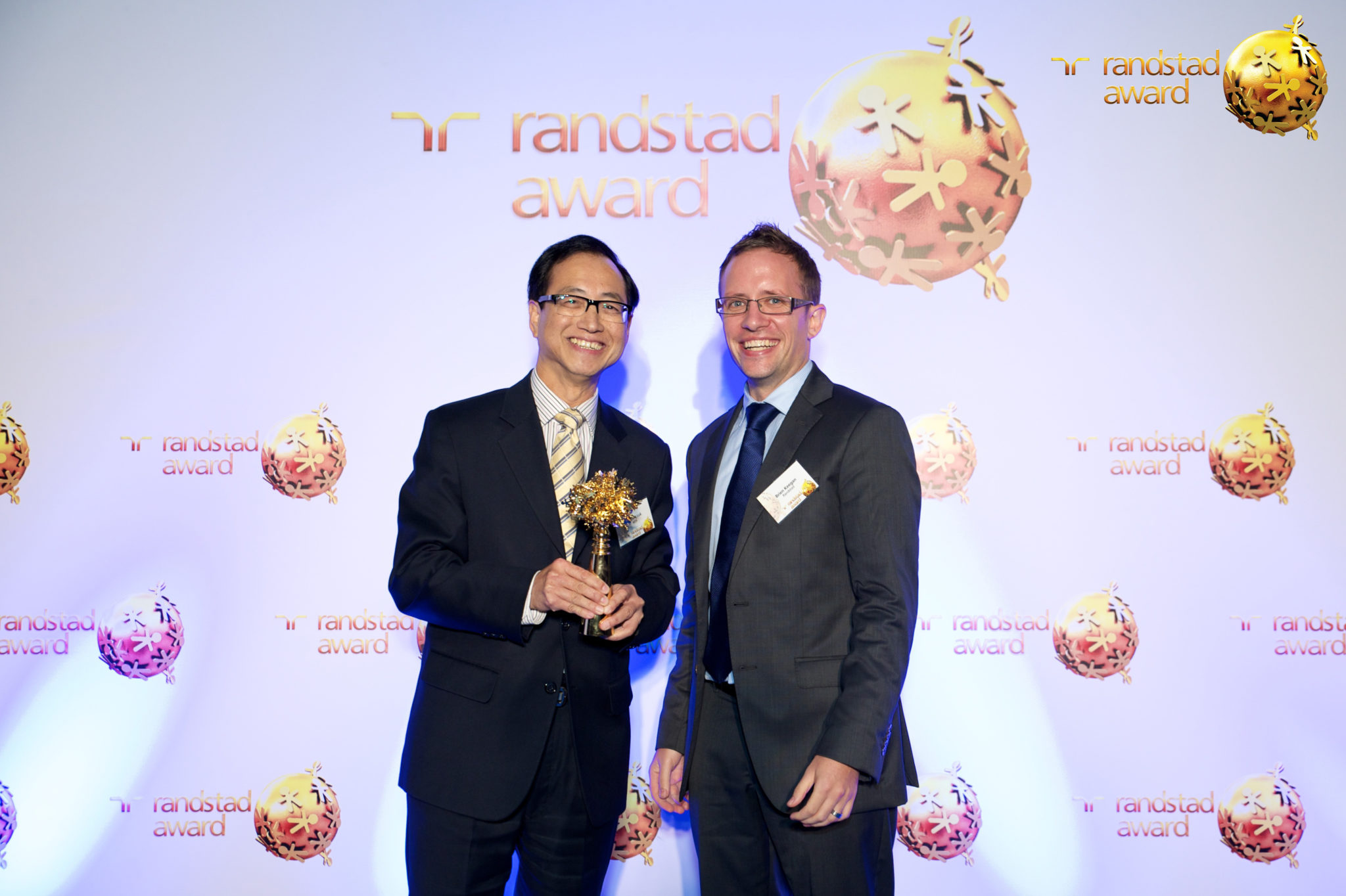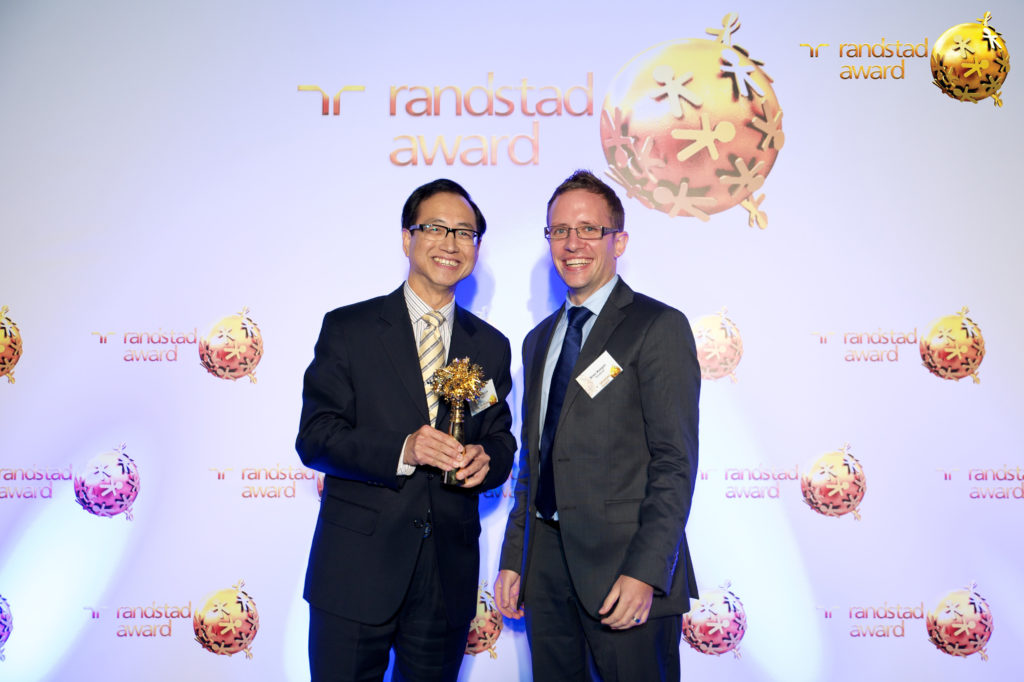
Itchy feet are common to career-enthused workers and the amenable Hong Kong labour market more often than not can satisfy their urge. Employers likewise are kept on their toes in finding ways to drive or protect competitive edge. How then can they tempt top talent and keep their own very firmly on home ground? Some suggest the only answer is strong employer branding. So what constitutes the employer brand and should it differ from that presented to the consumer?
The inaugural Randstad Award Hong Kong was launched at a glamorous gala-style affair at Central Pier 7’s Watermark restaurant on 17 April. First conducted in 1999 in Belgium, the award now takes place in 18 countries, becoming the world’s largest employer branding study. The Hong Kong based research, independently carried out by ICMA Group, discovered the employment-related views of more than 4,000 Hong Kong people of working age. The study found that of the 75 largest commercial employers by workforce size, MTR Corporation was rated ‘The Most Attractive Employer.’
According to Randstad the top talent challenges in Hong Kong are attracting talent for the next phase of growth, increasing workforce productivity and performance and retention of top performers. Brien Keegan, Director, Randstad Hong Kong commented, “With pockets of critical skills shortages, a rapidly ageing population and the need to drive greater workforce productivity, employer branding is critical to the attraction, engagement and retention of top market talent in Hong Kong.”
Randstad Award: Hong Kong winners’ showcase
2013 Winner—MTR Corporation
2013 Runner-up—SWIRE PROPERTIES
2013 Second runner-up—CLP
Banking & Finance sector—Hang Seng Bank
Best Workplace Culture—Hong Kong Disneyland
Best CSR—The Hong Kong Jockey Club
HR—the new marketing?
The guest speaker was Emma Reynolds, Co-founder and CEO, e3 Reloaded who offered a Gen-Y take on recruitment and engagement activities and advocated bringing what she considers archaic attitudes and processes into the 21st Century. Asking the audience of HR award-hopefuls who had applied for jobs 20 years ago and how much the process had changed since then, the audience concurred—very little. Yet, technology now makes so much more possible, she continued, and has done so in so many other aspects of daily life.
Today, Reynolds asserted, we are all marketeers. The consumer has immense power through the ability to connect and create change. The only sustainable competitive advantage is knowledge of the customer base achievable through continued understanding and engagement. According to Reynolds the employee and even the candidate demand and deserve sophistication in the same way. Her motto ‘work sucks’ expresses the sentiments of a generation placed in an environment with little resemblance to the outer world. Since power and knowledge are now in the hands of the masses—there is no longer a monologue from management to staff, or marketing to consumer, she contended; instead, a multi-way discourse must take place. Huge advertising budgets mean very little compared to the opinions of the consumer.
During a meal break Reynolds left the audience to consider how they would rate the customer, candidate and employer experience of their organisation in a trip-advisor style format, since, she insisted, these are intricately linked. Her purpose—to alarm HR once they appreciate that brand reputation is deeply affected by consumer and worker experience. Research has proven that 64% of customers will who have a bad experience will never buy a product again. The quality of experience make or break brand loyalty.
It becomes clear that the employer brand promotes the message of a company’s offer as an employer of choice, fostering loyalty and helping to build an emotional connection with potential and existing employees. This in turn results in higher levels of engagement and facilitates the attraction and retention of the best talent around. Strong employer branding, a good reputation and a highly engaged workforce delivers competitive advantage, superior financial results and sustainable growth.
Food for thought
The survey results reveal in-depth insights into the most important factors influencing jobseeker decisions today and allow Hong Kong’s largest employers to benchmark themselves against competitors.
Well over half the potential employees selected job security within their top five most important factors, followed by salary and pleasant working atmosphere, good work-life balance and career progression. "Interestingly, Hong Kong was the only place in Asia where employees most frequently put long-term job security ahead of salary as the prime reason for joining a particular company,” said Brien Keegan, Director, Randstad Hong Kong. “Employers need to take heed of this when looking to recruit, as the commonly held belief that employees, in Hong Kong at least, are just interested in money has proven untrue."
Other interesting findings included men preferring companies that offer career opportunities, quality products and services, good training and strong management where women search more for accessibility and a pleasant working atmosphere when choosing a specific company. A pleasant working atmosphere is more often linked with recognition and team spirit by job seekers than it is by an active workforce who are more likely to value open and honest communications and a sense of shared commitment. In turn, recognition and shared commitment were found to be more important to employees in the profit than the non-profit sector where fun activites are rated more highly.
In terms of retention, long-term job security and financial health are the main reasons to stay with a current employer, found to be particularly true in the case of older, lower educated women and older, lower educated men respectively. Overall, potential employees would change their employer more because of lacking compensation—especially true in the 18-39 age bracket, insufficient career opportunities—especially in younger, higher educated people and unreasonable work-life balance—especially in younger, higher educated men, curiously. When comparing office workers with managers, office workers would change their current employer more because of lacking compensation and career opportunities, whereas lacking work-life balance is more principal to managers.






